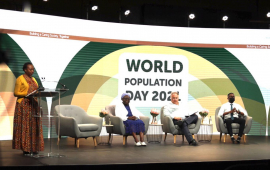
The economic and social impacts of COVID-19 have compounded the existing challenges young people face, threatening the prospects of reaping a demographic dividend.
“We have to admit that our tiniest, dynamic intervention and response measures to avoid spreading the disease had a number of unintended consequences, including disruptive implementation for the health sector, education, training, and of course, job opportunities,” said the Department of Social Development Acting Director-General, Linton Mchunu.
Mchunu was on Tuesday delivering the keynote address on behalf of Minister Lindiwe Zulu on the “Rights and Choices, Youth Demographic Dividend” during the commemoration of World Population Day in partnership with the United Nations Population Fund (UNPF).
Demographic dividend as defined by the UNPF is "the economic growth potential that can result from shifts in a population’s age structure, mainly when the share of the working-age population is larger than the non-working-age share of the population".
The two-day event aims to raise awareness on the importance of population and development related issues.
COVID-19
Mchunu told delegates that government has been working hard to cushion the poor from COVID-19's blow and loss of employment especially the youth and women, who are more likely employed in lower-earning informal sector jobs with no or limited social protection measures.
“When we did the first iteration of the R350 grant, we realised that a lot of young men in particular between the ages of 18 and 35, were the most applicants.”
However, the department saw a rise in female applicants during their second instalment when the Social Relief of Distress (SRD) grant opened to caregivers.
“And because women play a critical role as caregivers in this country, we have been able as department to provide that level of support, particularly because of the jobs that have been lost for that age bracket of young people.”
In addition, he said young, poor, and mostly females or Africans were hardest hit by lack of access to services such as healthcare.
“As human and financial resources were diverted to the COVID-19 response, sexual, gender-based violence and femicide, which was rife pre-COVID-19 escalated to an extent our President has termed it as the second pandemic.”
Sexual and reproductive health rights (SRHR)
Investing in sexual and reproductive health rights (SRHR) of adolescents was fundamental to realise the rights and potential of young people and a precondition for harnessing a demographic dividend.
“However, we’ll not be able to achieve demographic dividend or the world where every young person has body autonomy and able to make informed choices about their bodies, fertility and ultimately, their futures if gender inequality and discrimination remains unabated,” he said.
“Therefore, achieving gender equality should therefore be at the forefront of our developmental agenda.”
However, he admitted that their efforts have fallen short.
“Despite some progress and important steps in the appropriate direction, women's and girls’ rights in particular for their SHSR are still in a way forgotten.”
However, according to Mchunu, it was not only doom and gloom, as government continues to reflect on how to accelerate adolescent SRHR for the attainment of a demographic dividend.
“What we have learned so far is that specific challenges require specific attention and targeted responses and that if we want to safeguard the demographic dividend, we need to develop a strategy.”
This includes developing strategic and targeted evidence-based short and long-term recovery plans that are in line with international commitments such as Agenda 2063: The Africa We Want, Nairobi Summit on ICPD25 Commitments, as well as the 2030 Sustainable Development Goals.
In addition, he said that government’s response should be youth-centred.
This, according to Mchunu, starts from providing quality education and skills training, ensuring a conducive environment that provides decent jobs and entrepreneurship, and providing quality and holistic health, including sexual and reproductive health and rights services.
UNFPA Officer-in-Charge for South Africa, Dr Agathe Lawson, said all the UN agencies are committed to ensuring that they continue to work for the benefit of children, workers, women and the youth.
“It’s unacceptable that most African countries have 40% of young people who are unemployed, who have certificates, some even master degrees,” she said.
Lawson said she would like to see the information discussed on this platform trickle down to the youth.
“Just imagine a world where 40% of bright, young people are working, participating in the development of their country and inventing. This is for the benefit of everyone.” – SAnews.gov.za


